This year’s conference also marked the 25-year anniversary of CEEMAN. The University of New York in Prague (UNYP), the largest and leading English-language higher education institution in the Czech Republic, was the partner and host of the event. Andreas Antonopoulos, rector of UNYP, and his team did an outstanding job of making sure everything ran smoothly at the conference. The team also hosted an elegant gala dinner at the Saint Agnes Convent in Prague.
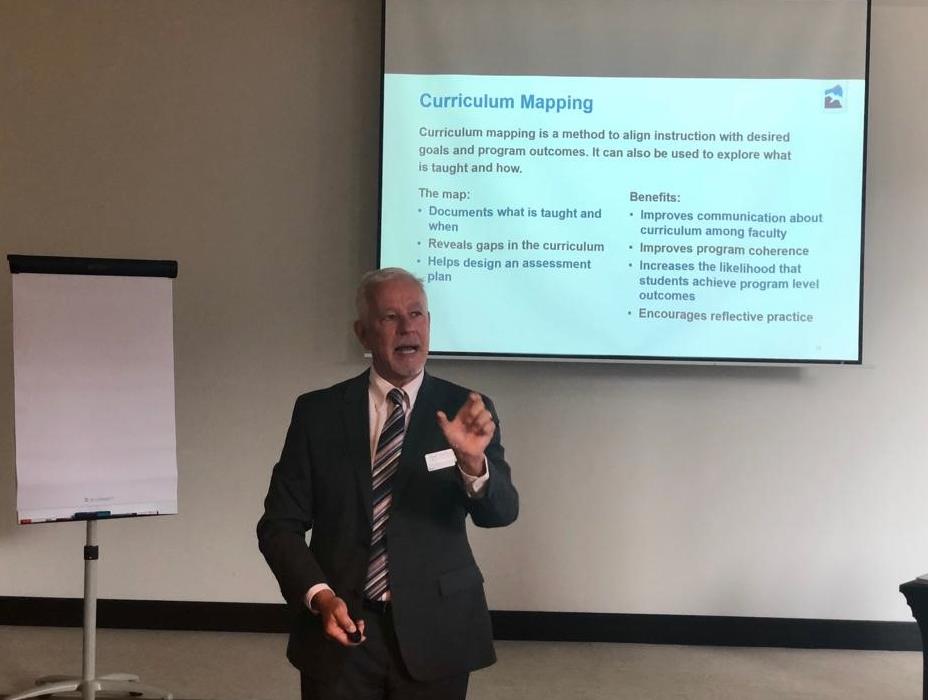 Several pre-conference events acquainted participants with the services that CEEMAN offers its members. The Peregrine Academic Service Workshop, led by Paul Mallette, Director of European Operations, focused on how member institutions can address key standards of CEEMAN IQA with particular reference to learning outcomes.
Several pre-conference events acquainted participants with the services that CEEMAN offers its members. The Peregrine Academic Service Workshop, led by Paul Mallette, Director of European Operations, focused on how member institutions can address key standards of CEEMAN IQA with particular reference to learning outcomes.
Alenka Braček Lalić, CEEMAN IQA Director, led the Hidden Champions in CEE session, which was well attended and highlighted the diversity of research projects underway at CEEMAN institutions. Professor Xiaobo Wu, former dean of the School of Management at Zhejiang University and CEEMAN Vice President for China, offered up his predictions for growth in the Chinese markets. He noted that talent is critical for China and the goal of management education is to prepare Chinese students to be ready to lead in a fast-changing world.
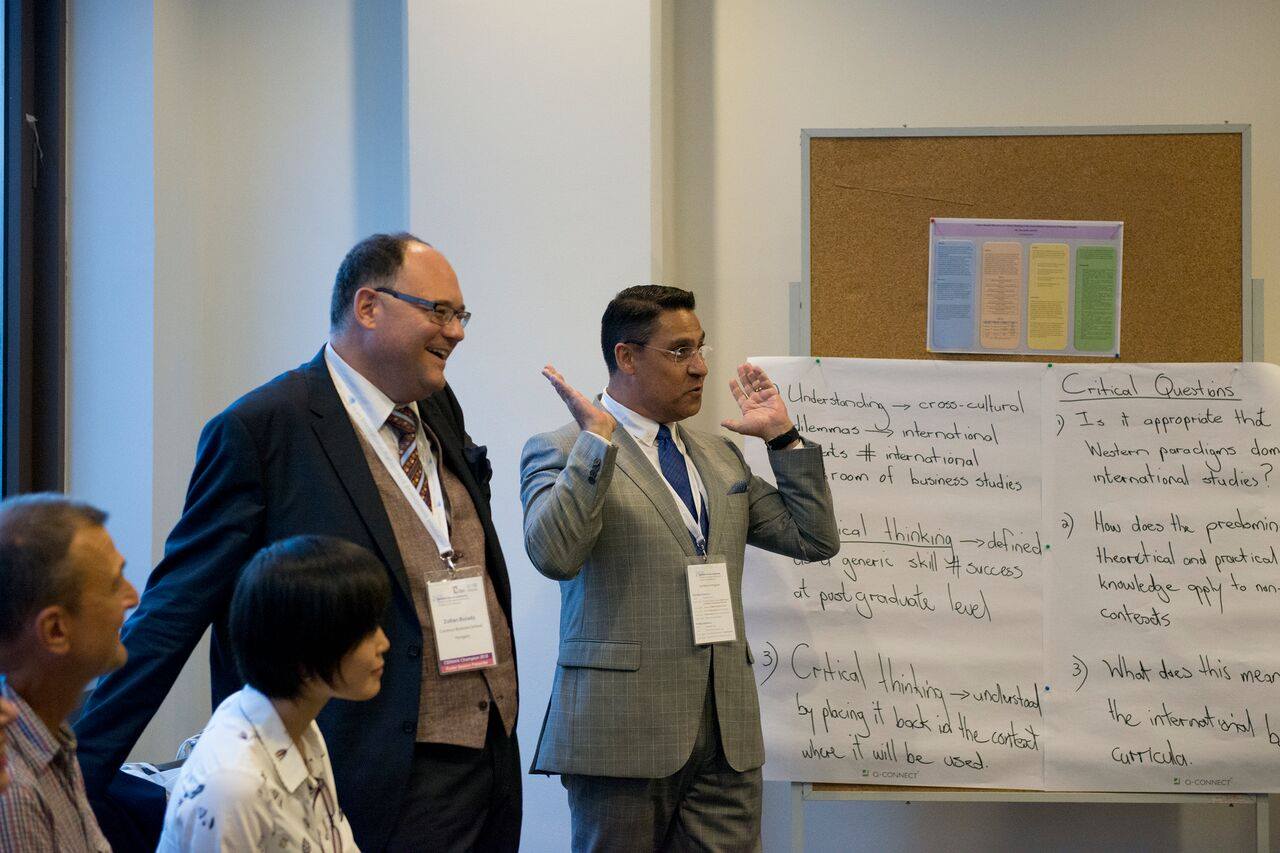 This year‘s Poster session was lively and engaging and offered a variety of highly innovative and entrepreneurial presentations that thoroughly captured the attention of attendees with topics that ranged from Sustainable Management (Monika Kolb, Cologne Business School, Germany) to Virtual Exchange (Amy Gillett, Director William Davison Institute, University of Michigan). Zoltan Buzády (Corvinus University, Hungary) offered the opening and closing remarks and also presented finding on a comparative study of East v. West leadership skills.
This year‘s Poster session was lively and engaging and offered a variety of highly innovative and entrepreneurial presentations that thoroughly captured the attention of attendees with topics that ranged from Sustainable Management (Monika Kolb, Cologne Business School, Germany) to Virtual Exchange (Amy Gillett, Director William Davison Institute, University of Michigan). Zoltan Buzády (Corvinus University, Hungary) offered the opening and closing remarks and also presented finding on a comparative study of East v. West leadership skills.
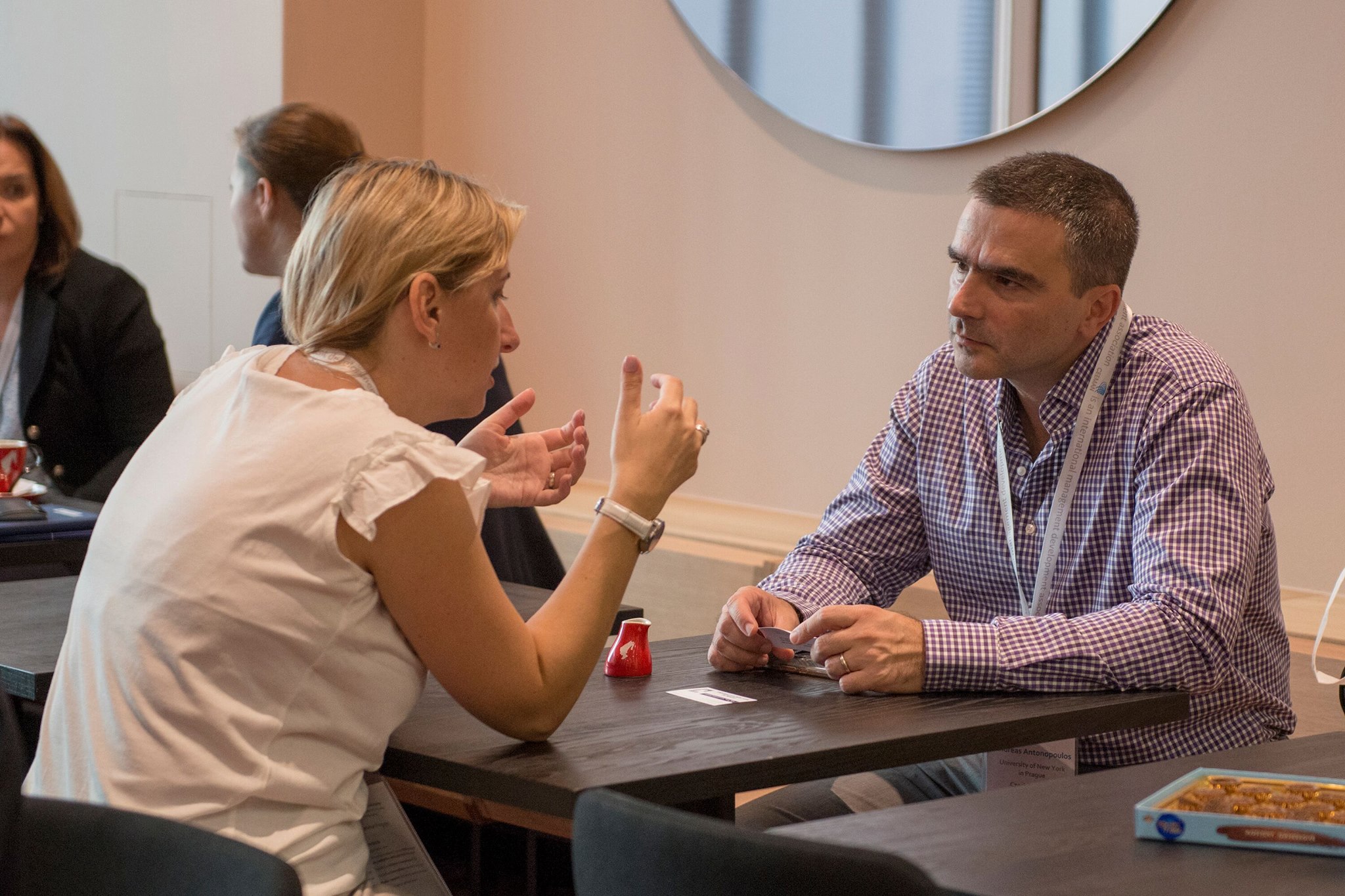 The Dean2Dean advisory session also saw a jump in attendance as more deans seek advice and share best practices and ideas with each other.
The Dean2Dean advisory session also saw a jump in attendance as more deans seek advice and share best practices and ideas with each other.
The second and official first day of the 26th CEEMAN Annual Conference began with the popular practice of visits to established businesses to learn about their managerial practices. UNYP arranged three excellent tours of very different and successful companies operating in Prague: GZ Media, Microsoft, and Staropramen. While the presentations were unique, all of the companies offered insights into the management leadership they need to continue to be successful in the future.
Danica Purg welcomed the crowd to the conference noting that it was good to be back in Prague. The last time CEEMAN hosted its annual conference in Prague was in 1996. Andreas Antonopoulos introduced the first speaker, Jindřich Fryč, the state secretary at the Ministry of Education, Youth and Sport of the Czech Republic who praised CEEMAN as a great organization.
Fryč’s opening remarks were followed by Jan Fischer, the former prime minister of the Czech Republic and former Vice president of EBRD. Fischer, who identified himself as a life-long statistician, spoke of the deepening inequalities, fragmentation of society, and the importance of sustainability — and the important roles that management and government have in improving the processes and outcomes for society.
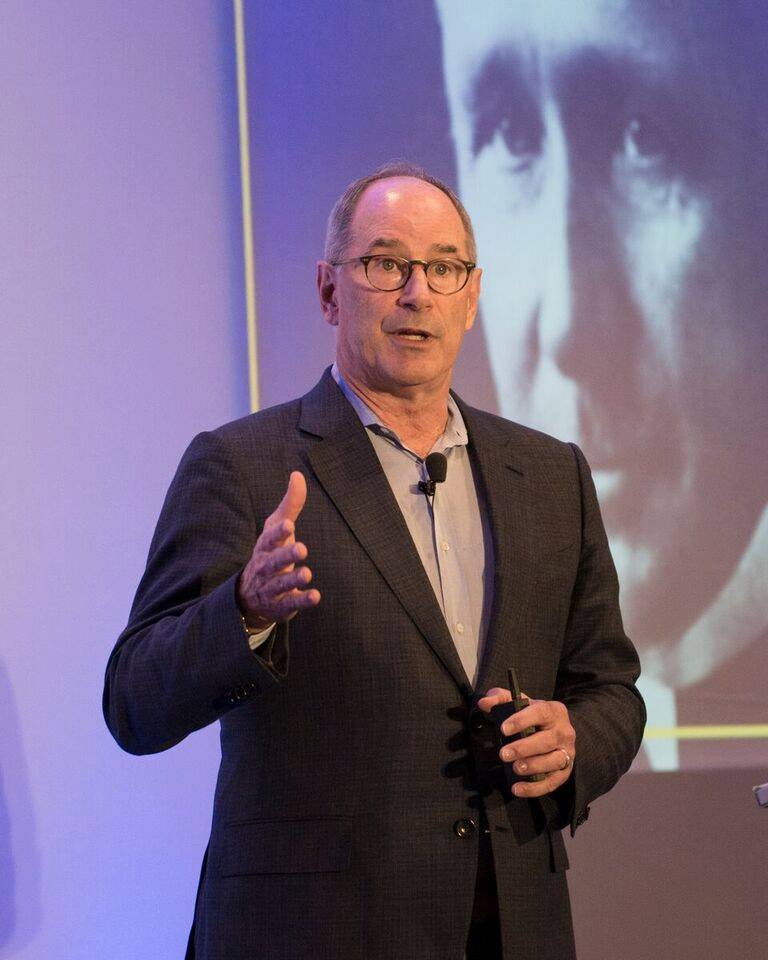
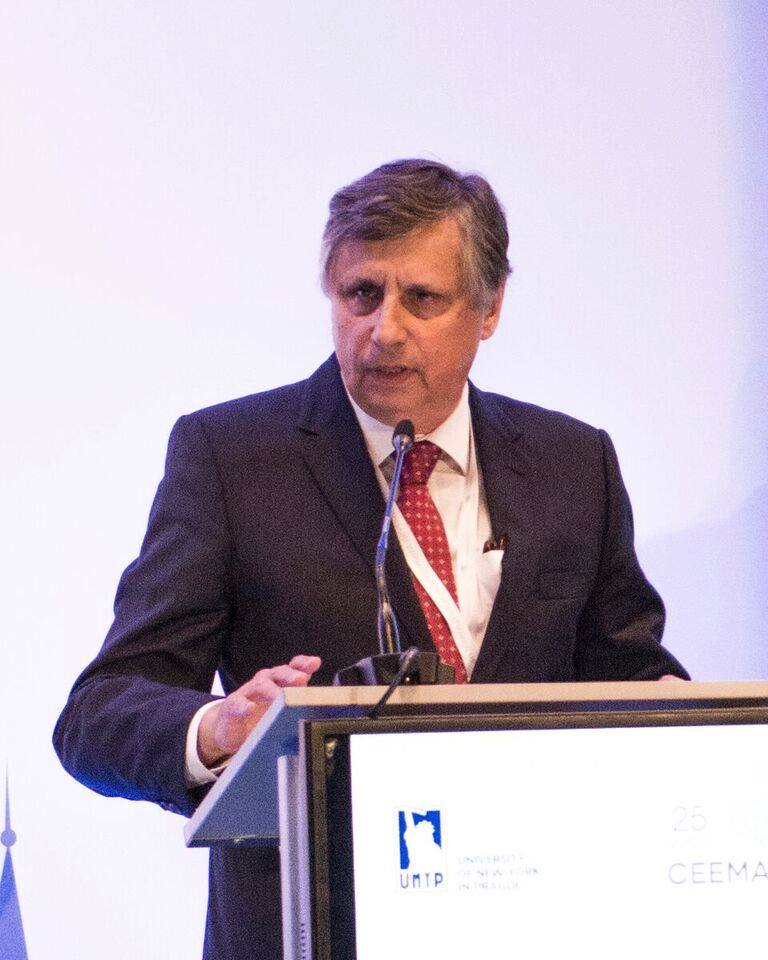
The first keynote speaker, Roger Martin, former dean of Rotman Business School, Toronto, Canada, talked about the dark side of efficiency, which puts pressure on industries, which in turn, leads to mono-cultures, or overwhelming dominance of certain companies. He suggested that we need to think carefully about a proxy for efficiency because the more efficient we are, the less resilient the economy becomes. According to Martin, our obsession with efficiency has gotten us Amazon. Martin’s presentation was a sobering review of democratic capitalism and a call for more balance in management education and focus.
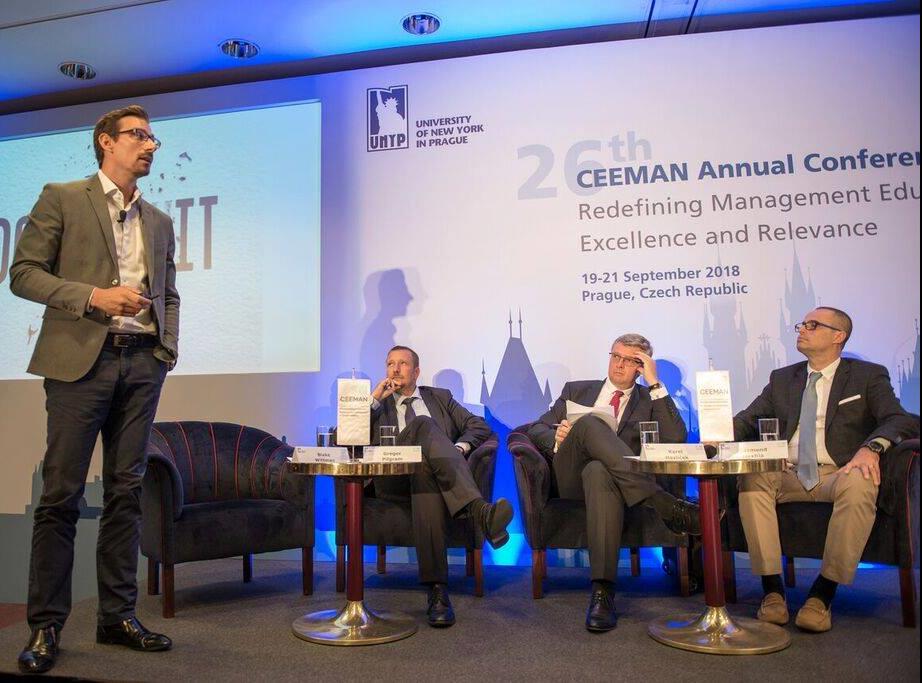 Following Roger Martin’s talk, the Business Panel hosted by Gazmend Haxhia, CEEMAN Vice President for Corporate Relations and president of A.S.G. Group, Albania sought to answer the question: What do businesses need today? Karel Havliček, founder and chairman of the Association of Small & Medium Sized Enterprises and vice chairman of the Government Council for Research, Development and Innovation, said that businesses expect universities to transform skills to meet global challenges. Gregor Pilgram, CFO and member of the board of Generali CEE Holding, offered that business‘ challenges require new ways of thinking. Blake Wittman, Director for Europe at GoodGroup and Business Advisory Board Member at UNYP, noted that business wants „complex hybrid workers.“ He said the skill sets needed for today will not be the same in just a few years. At the World Economic Forum, they said that by 2020 the top three skills companies will need are: 1) Complex problem solving, 2) Critical thinking, and 3) Creativity. Gazmend Haxhia asked the panel to sum up what business wants:
Following Roger Martin’s talk, the Business Panel hosted by Gazmend Haxhia, CEEMAN Vice President for Corporate Relations and president of A.S.G. Group, Albania sought to answer the question: What do businesses need today? Karel Havliček, founder and chairman of the Association of Small & Medium Sized Enterprises and vice chairman of the Government Council for Research, Development and Innovation, said that businesses expect universities to transform skills to meet global challenges. Gregor Pilgram, CFO and member of the board of Generali CEE Holding, offered that business‘ challenges require new ways of thinking. Blake Wittman, Director for Europe at GoodGroup and Business Advisory Board Member at UNYP, noted that business wants „complex hybrid workers.“ He said the skill sets needed for today will not be the same in just a few years. At the World Economic Forum, they said that by 2020 the top three skills companies will need are: 1) Complex problem solving, 2) Critical thinking, and 3) Creativity. Gazmend Haxhia asked the panel to sum up what business wants:
Karel: Common Sense
Blake: Prepare students
Gregor: Solve problems
By the afternoon, attendees were ready for the launch of the CEEMAN Manifesto by Danica Purg and Derek Abell, CEEMAN board member and President of the IQA Accreditation Committee. Purg began the presentation by talking about the beginning of CEEMAN: „We had to work together and we mimicked the West,“ she said. „Then, we shared our knowledge, and now it is time to reinvent and redefine our next 25 years.“ Abell noted that the CEEMAN board represents rising markets and if change is going to happen, it will be from representatives of dynamic societies. He then said in reference to the Manifesto: „This is a launchpad. There are no specific recommendations. Rather, this is a provocation.“ Abell identified the Leading the Way in Management Development Workshop in November as a way for institutions to get up to speed quickly in order to focus relevance and excellence on practice.
After the introduction of the Manifesto, the conference attendees departed by buses to Kolkovna Celnice, an original Pilsner Restaurant in the Old Town to enjoy each other’s company and to discuss the presentations of the first day.
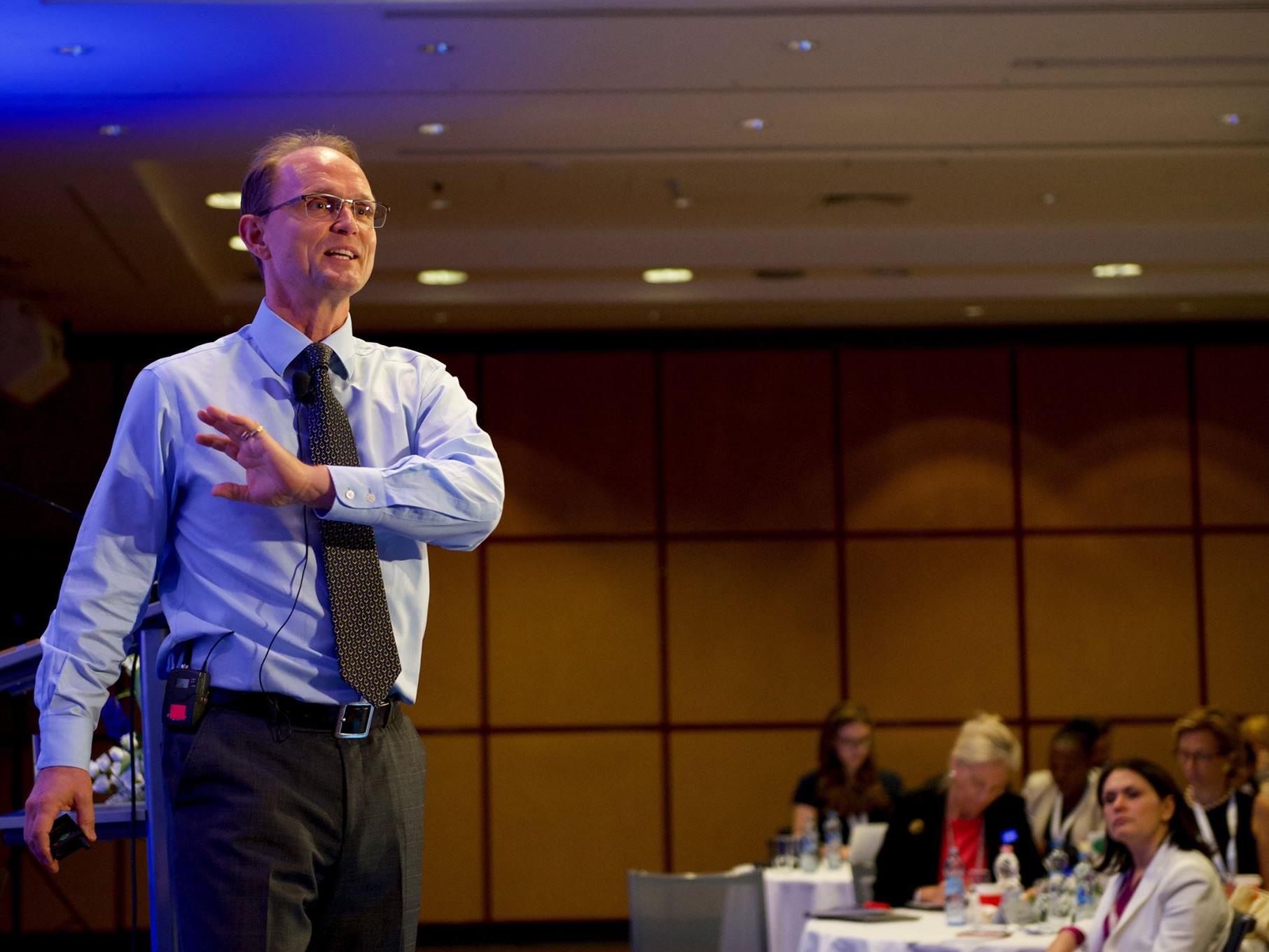 Day two of the conference began with a high energy keynote presentation by Johan Roos, Chief Academic Officer and Professor of General Management and Strategy at Hult International Business School, UK. Roos said that the way to lead an institution to new levels of relevance and excellence is to treat all colleagues as volunteer workers. „A good manager must drive change through passion and engagement, rather than with the stick,“ he said. The keys to future success for management development education include:
Day two of the conference began with a high energy keynote presentation by Johan Roos, Chief Academic Officer and Professor of General Management and Strategy at Hult International Business School, UK. Roos said that the way to lead an institution to new levels of relevance and excellence is to treat all colleagues as volunteer workers. „A good manager must drive change through passion and engagement, rather than with the stick,“ he said. The keys to future success for management development education include:
1) Balancing knowledge with skills
2) Developing a future mindset
3) Compressing and stretching
4) Output and impact and focused research
Roos said it is time to challenge conventional thinking throughout the educational system. What does lifelong learning really mean? Why do we have 3-credit courses? Is there a reason or is it simply tradition?
Roos said that business schools had fallen away from having society front and center of their curricula. „We devolved into teaching amoral theory,“ simply providing token ethics courses. „All of that is changing,“ Roos indicated. „We are on a full swing back. Impact and engagement are in the air — everywhere.“
In his conclusion, Roos said that the Manifesto is a great document and a good beginning for change. He also remarked that the approach institutions take when it comes to accreditation procedures can make a significant difference, and that the rigidity of reviewers tends to be overstated: "If you prepare well with your team, interact in a constructive way and treat the review teams as real peers, accreditation can be very helpful!"
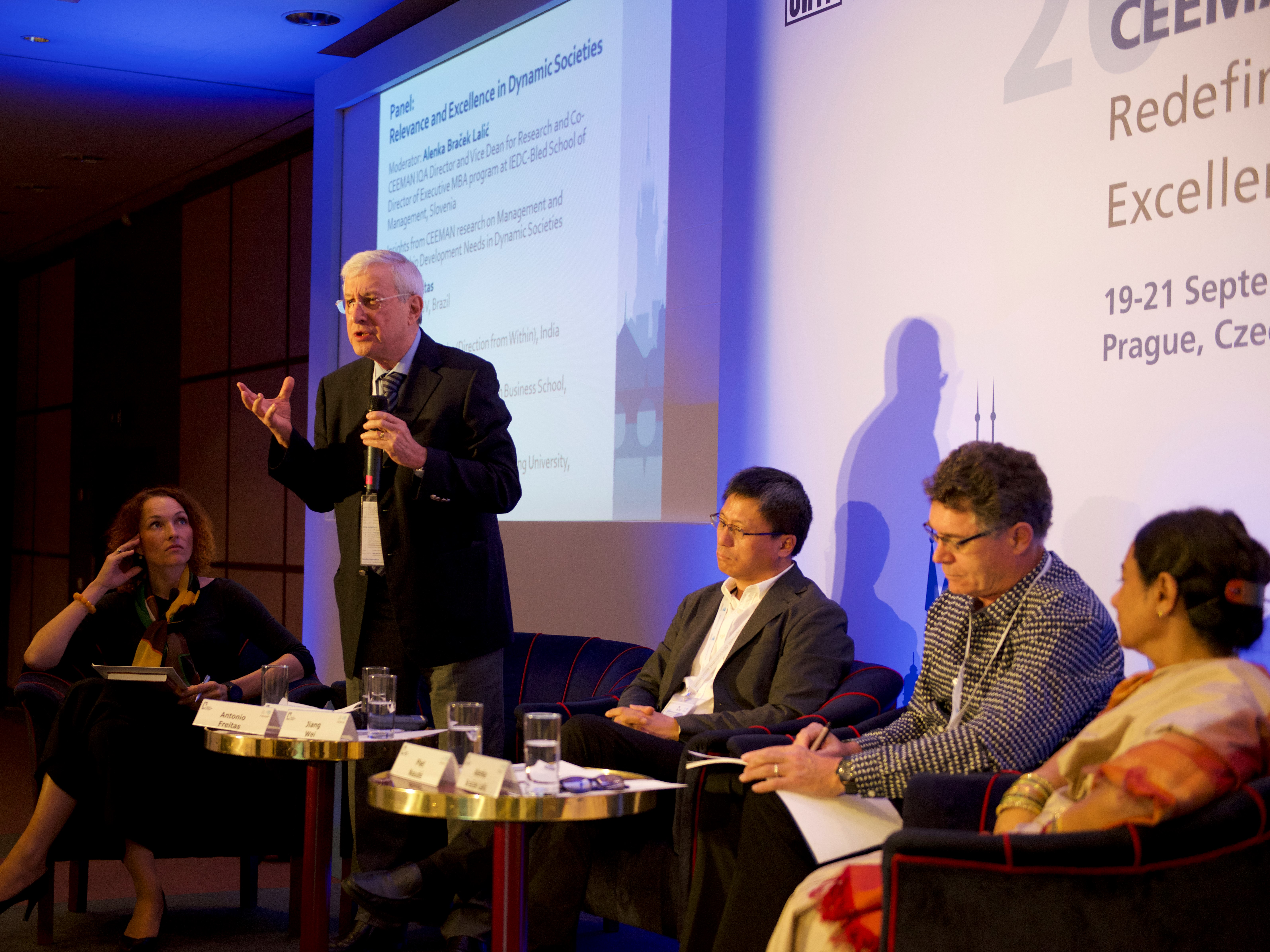 One of the most watched panels was „Relevance and Excellence in Dynamic Societies,“ facilitated by Alenka Braček Lalić. Panelists were from Brazil, China, India, and Africa, and really highlighted the diversity of representation in CEEMAN. Antonio Freitas, provost of FGV, Brazil, stressed the importance of relevance for society. „We have to see the bigger picture in what we do and teach and research,“ he said. Piet Naudé, dean of the University of Stellenbosch Business School, South Africa, said that excellence was the key purpose and relevance the central issue. „In Africa we have to fight for democracy — we need a pendulum swing back to locality for our relevance,“ he stated. Indira Parikh, president of Antardisha, India, gave the audience a primer on what was lost through colonialism. „We lost our language and much of our culture,“ she said. She believes that Indian education based on the Western model has created a dilemma for Indians because Indian culture and Western education are for the most part incompatible. She suggested that the importance of excellence and relevance cannot be overstated. Jiang Wei, dean of the School of Management, Zheijang University, China, said that the most important thing for China is that the universities should not educate for employment, but for the future success of improving China.
One of the most watched panels was „Relevance and Excellence in Dynamic Societies,“ facilitated by Alenka Braček Lalić. Panelists were from Brazil, China, India, and Africa, and really highlighted the diversity of representation in CEEMAN. Antonio Freitas, provost of FGV, Brazil, stressed the importance of relevance for society. „We have to see the bigger picture in what we do and teach and research,“ he said. Piet Naudé, dean of the University of Stellenbosch Business School, South Africa, said that excellence was the key purpose and relevance the central issue. „In Africa we have to fight for democracy — we need a pendulum swing back to locality for our relevance,“ he stated. Indira Parikh, president of Antardisha, India, gave the audience a primer on what was lost through colonialism. „We lost our language and much of our culture,“ she said. She believes that Indian education based on the Western model has created a dilemma for Indians because Indian culture and Western education are for the most part incompatible. She suggested that the importance of excellence and relevance cannot be overstated. Jiang Wei, dean of the School of Management, Zheijang University, China, said that the most important thing for China is that the universities should not educate for employment, but for the future success of improving China.
The question was asked „What are the differences between IQA and AACSB and EQUIS?“ Alenka Braček Lalić and Sergey Myasoedov, CEEMAN Vice President for Russia and president of RABE, said that IQA is different. „Relevance is more important to us. It is a distinctive feature of our accreditation. We are about how to bring schools that are in dynamic societies up to a level of relevance that makes their graduates competitive in the global marketplace and capable of solving local issues.“ Braček Lalić went on to add: „Relevance cannot be prescribed.“
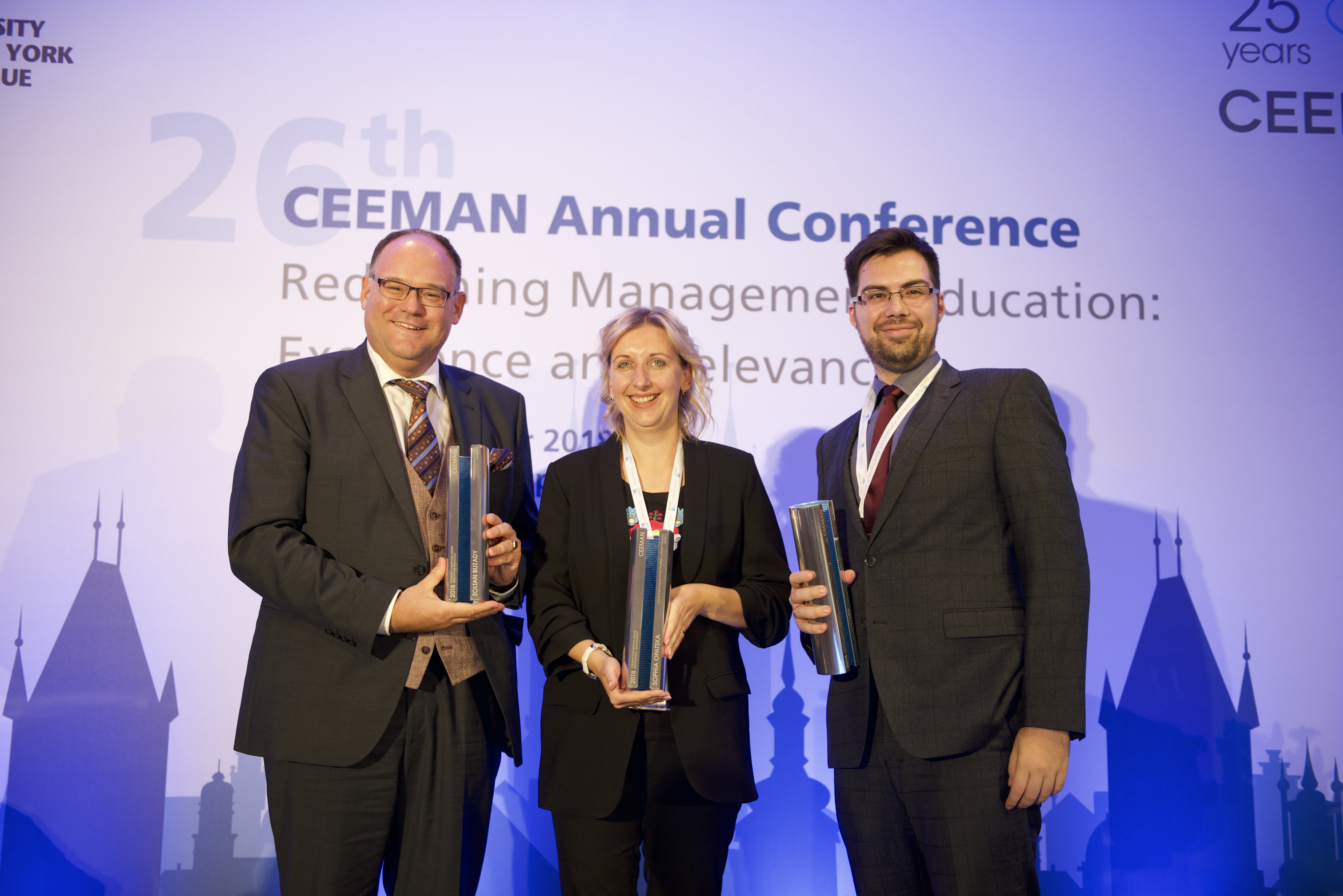 In the afternoon, awards were given out to the winners of the CEEMAN & Emerald Case Writing Competition and to the CEEMAN Champions. New members were recognized, institutions recently accredited by IQA were announced and CEEMAN business was discussed.
In the afternoon, awards were given out to the winners of the CEEMAN & Emerald Case Writing Competition and to the CEEMAN Champions. New members were recognized, institutions recently accredited by IQA were announced and CEEMAN business was discussed.
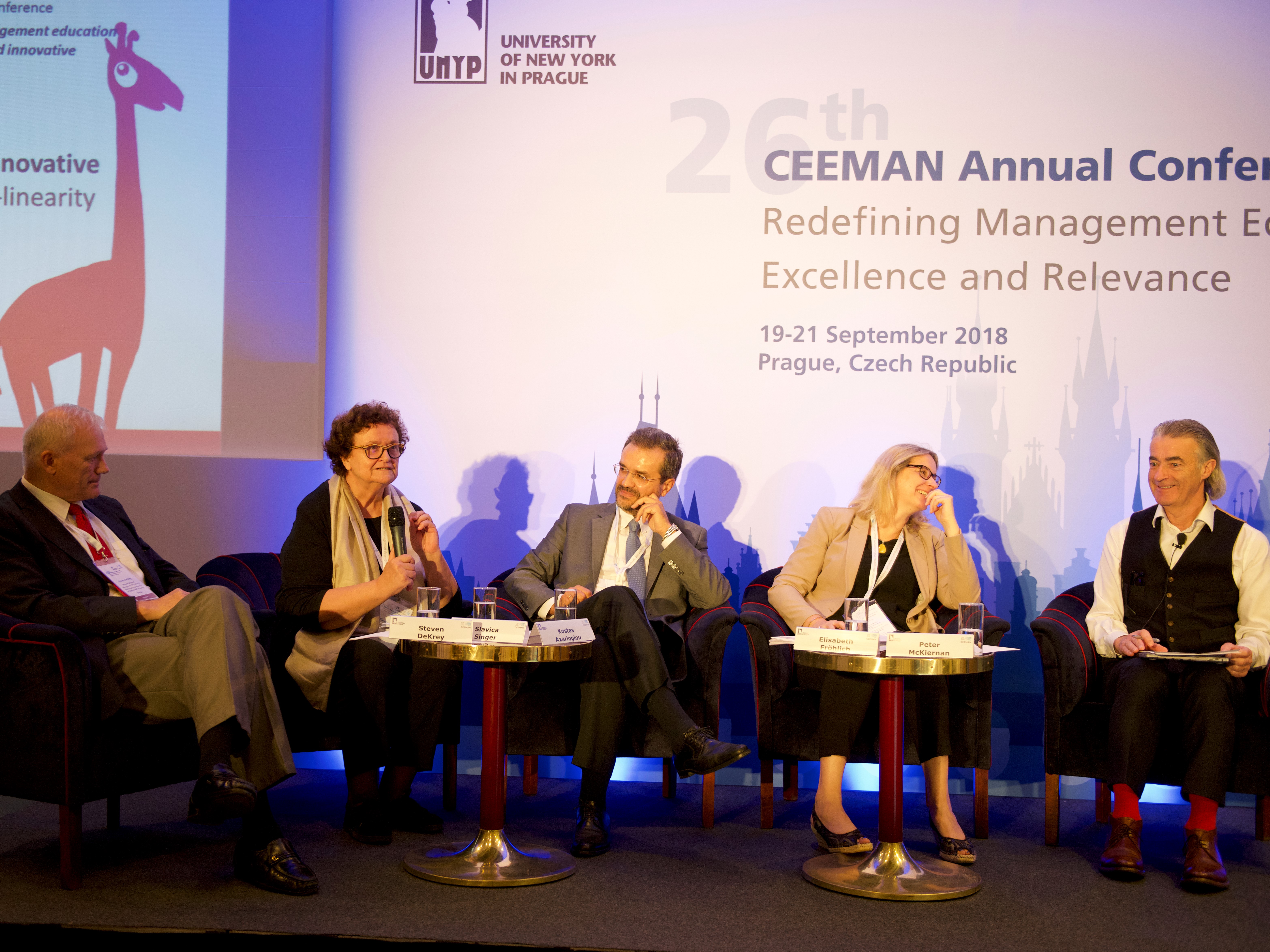 Peter McKiernan, professor of management at the University of Strathclyde, UK, led a panel discussion on Redefining Management Education Through Innovations and Innovative Partnerships. Lisa Fröhlich, president of CBS Cologne Business School GmbH, Kostas Axarloglou, Dean of ALBA Graduate Business School at the American College of Greece, and Steven Dekrey, Chairman of the Academic Council at Moscow School of Management, all spoke of partnerships they developed with businesses and other schools. Slavica Singer, UNESCO Chair in Entrepreneurship, J.J. Strossmayer University of Osijek, Croatia, talked about the „dark days“ of the war when her building took 29 direct hits from bombs. „We went on because we had to.“ Singer remembers calling Danica Purg for help and understanding. „She stood by me and that made all the difference.“
Peter McKiernan, professor of management at the University of Strathclyde, UK, led a panel discussion on Redefining Management Education Through Innovations and Innovative Partnerships. Lisa Fröhlich, president of CBS Cologne Business School GmbH, Kostas Axarloglou, Dean of ALBA Graduate Business School at the American College of Greece, and Steven Dekrey, Chairman of the Academic Council at Moscow School of Management, all spoke of partnerships they developed with businesses and other schools. Slavica Singer, UNESCO Chair in Entrepreneurship, J.J. Strossmayer University of Osijek, Croatia, talked about the „dark days“ of the war when her building took 29 direct hits from bombs. „We went on because we had to.“ Singer remembers calling Danica Purg for help and understanding. „She stood by me and that made all the difference.“
To close out the working portion of the conference, Virginijus Kundrotas, CEEMAN Vice President for Northern Europe and president of BMDA, led the interactive conversation in the World Café. The topic, Envisioning the Future of Management Education Together, was well-received with much spirited discussion happening at each table.
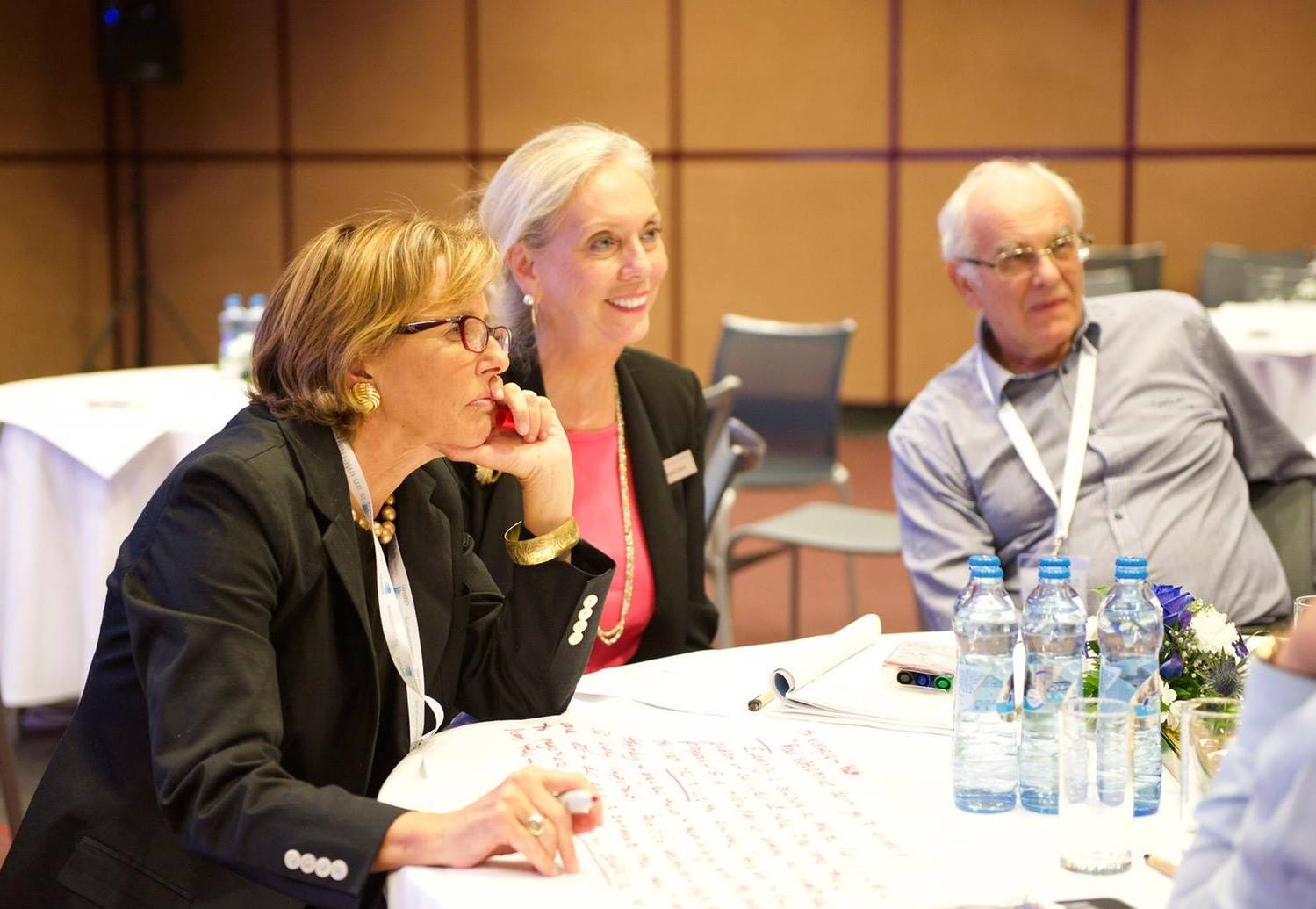
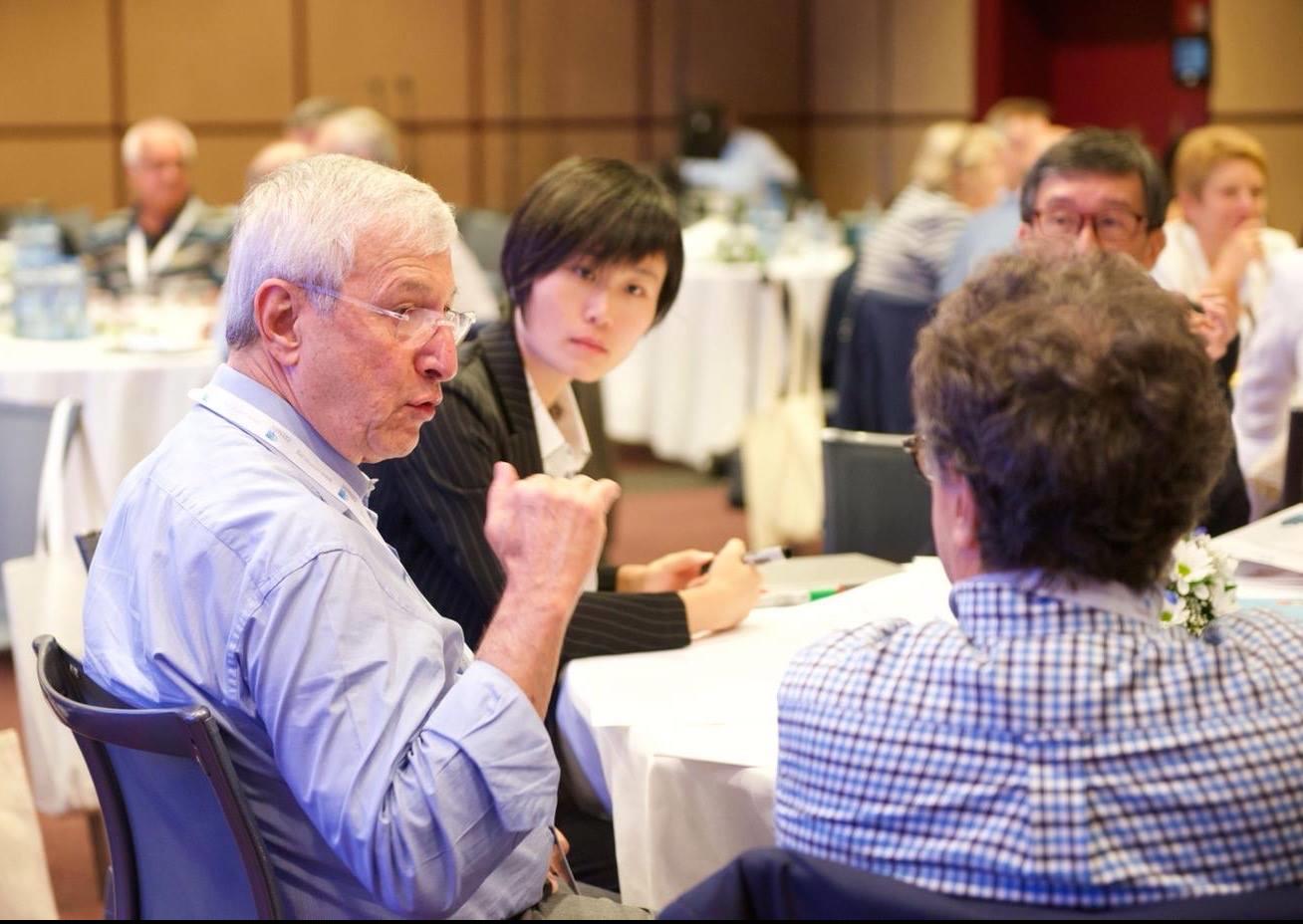
To conclude the 26th CEEMAN Annual Conference, Astrid Sheil, Professor at California State University, San Bernardino, offered her reflections of the conference. Finally, Andreas Antonopoulos gaveled the conference to a close and all participants went on to the Gala Dinner and Anniversary Celebration.
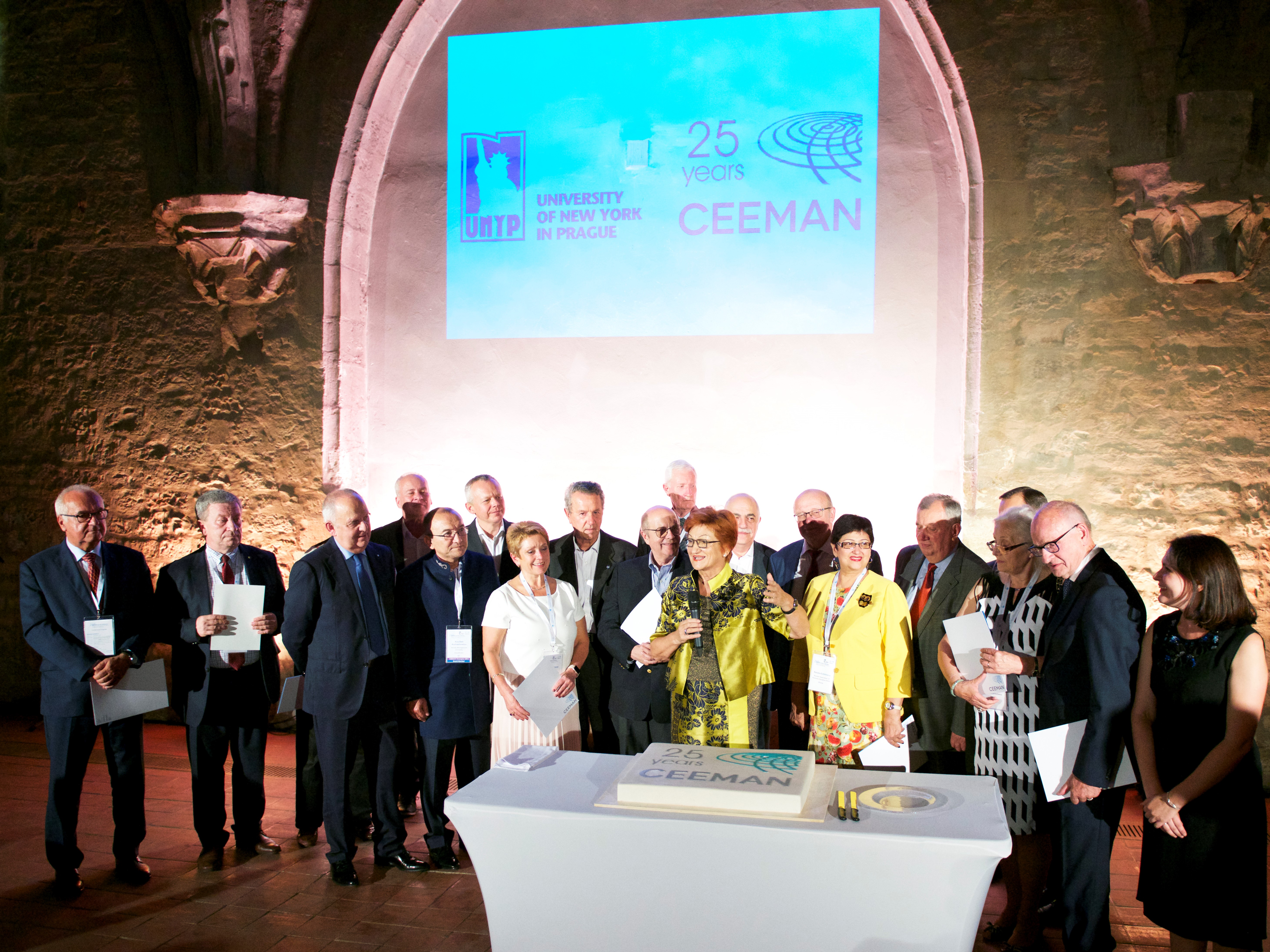
A good time was had by all! CEEMAN will announce the location and host of the 27th CEEMAN Annual Conference in the upcoming weeks, and the Conference proceedings will be distributed among members at the end of the year.